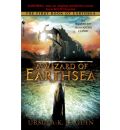Sparrowhawks, Life, and Death
This morning we noticed that the various bird life (blackbirds, finches, pigeons and tits of various sorts) were getting a little antsy.
Then Kate noticed the Sparrowhawk sitting on a branch in the apple tree just above the bird feeder — as if he was sitting, waiting for breakfast.  We get the occasional birdstrike in the garden, a random scattering of feathers, but this is the first time he’s taken to waiting.
We get the occasional birdstrike in the garden, a random scattering of feathers, but this is the first time he’s taken to waiting.
It’s oddly appropriate, gievn my reading material of late. In an attempt to re-evaluate some of the standards of the SF and fantasy genres, I’ve been re-reading some of the standards. Before Microcon, it was Dune, The Man in the High Castle and Pavane (I was giving a presentation on Alternate History).
Since Microcon, my reading has been the original Earthsea trilogy (A Wizard of Earthsea, The Tombs of Atuan and The Farthest Shore), together with the two more recent novels, which are most definitely not children’s books (many people still argue about whether the original trilogy is; since Sparrowhawk is a youth in the first novel, and teenagers feature in the second and third volumes, I’d classify them as YA).
But Tehanu: The Last Book of Earthsea (which actually isn’t the last book) and The Other Wind (which at this point is) are books about loss of vitality, about change, about growing old and even death. Tehanu is as bitter as wormwood, a novel in which Tehan is powerless throughout most of the book, the victim of random (male) violence and pointless cruelty.
Tehanu won the 1990 Nebula, a rare accolade for a fantasy novel, but IMO The Other Wind which shares a theme with Keith Roberts “The Passing of the Dragons” (bit of a spoiler there) is the better novel. Or maybe it’s just more to my taste. But that’s not to say it’s any lighter. But neither book is in any way YA.
Hawk, as Sparrowhawk now calls himself, is now seventy, still a vital man, but long past his physical prime, spending his days fixing the farmhouse and trying to persuade the goats to stop breaking into the vegetable plots. Hawk spends most of the book off-stage, left behind by the events that have seen dragons attacking people’s crops on other islands. Instead it’s Lebannen from The Farthest Shore, Tenar and her daughter from Tehanu and a number of other characters who dominate the novel. It’s a novel about the inevitability of death, and the actual desirability of a finite lifespan. Unlike our modern society, Hawk, Tenar and the mages are actively sought for their wisdom.
Those two points got me to thinking about our society. I’ve written before about the way our media fixates on youth and tends to depict the old as a burden, even a problem. That’s started to change slightly with a recent BBC series –when teenage meets old age– but much of the media coverage highlights the ‘problem’ of pensions.
We’re now all going to be made to work much longer –I estimate my retirement age will be seventy, Kate’s will even be seventy-five– and this is justified by the claim that we’re all going to live much longer. But while all the debate is about the length of our life-spans, no one seems to consider the quality of life, rather than the length of them. Does anyone really fancy dragging their osteo-arthritis ridden bodies out of bed on a Monday morning into their eighties? What about the increasing spread of dementia?
Perhaps we ought to change the parameters of the debate from how long, to how good?
